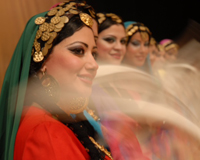Contact Center
.
31 October 2013
Zakkhat Masriya at the heart of Egyptian Culture Nights In Bahrain


An Arabian night without Egyptian music is like shade of mediocrity in emptiness. In celebration of Manama as the Capital of Arab Tourism 2013, and collaboration with the Egyptian Embassy and the Egyptian Tourism Authority, Bahrain's Ministry of Culture presened Egyptian Zakhaat, a musical dance show featuring two of Egypt's most iconic groups: Reda Troupe and the Abdel Halim Nowera Ensemble for Arabic Music. The Abdel Halim Nowera Ensemble for Arabic Music remains a strong force of culture and creativity under Maestro Salah Ghobashi, performing with the Arab world’s most iconic singers in shows and festivals at Cairo’s Dar Opera.
Egyptian Zakhaat , from Nile to Bahrain a journey animated by a music band that aims at preserving and renewing the Arabic music heritage without changing the traditional rhythm created by both Egyptian and Arab composers is an important task. In fact , in 1967 the now deceased conductor Abdel Halim Nowera founded the Arab Music Company. It consists of 50 talented singers and 40 musicians performing different styles of Arab music such as Mowashah, Taktoka, and theatrical music. Abroad, the company performed in different Arab countries like Tunisia, Morocco, Algeria, Libya, Lebanon, Jordan, Syria, and Kuwait, as well as in countries like France, Spain and Turkey.
The band entertained the audience with Arabic music and songs. The band is a musical sextet belonging to Abdul Halim Nowera Ensemble for Arab music. It performs different styles of Arab Music such as Mowashah, Taktoka, and theatrical music. In his leadership style, Maestro Ghobashi seeked to continue to preserve the original heritage of the music and songs, while introducing some contemporary developments to the presentation of the music to appeal to a new generation.
After this concert show, the Reda Troupe, which is specialized in folk music and dance and established in 1959 by artist Mahmoud Reda, performed different artistic shows for 60 minutes, presenting 13 performances reflecting the daily life of Egyptian sailors and South Egypt region farmers. Reda’s signature choreography mixed elements of different folk dances from Egypt’s diverse landscapes, and with the support of Dr. Hassan Fahmy and later, the Egyptian government, gained a strong national and international following.In 1962, the Reda Troupe joined forces with Ali Ismael, who developed an orchestra counterpart and provided the musical score for their productions together.
The group would come to feature in Egyptian blockbuster films Ejazat Nusf Sana, Love in Karnak, and The Paper Thief, tour internationally in over 60 countries, collect multiple awards and perform on some of the world’s most prestigious stages: Royal Albert Hall, Carnegie Hall, Olympia, and the Stanislavsky theatre. Currently a collection of 24 dancers, 30 musicians and a 75 member chorus comprise the Reda Troupe, and under the direction of artist Ehab Hassan, continues to be Egypt’s premier folk group and an authority on oriental dance.







